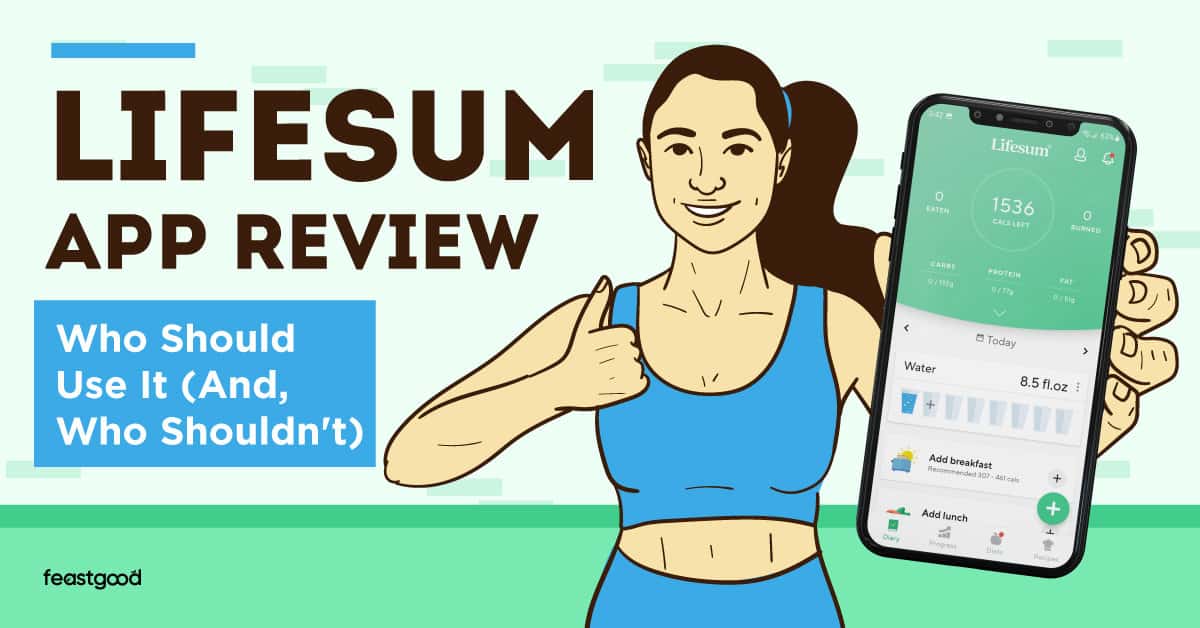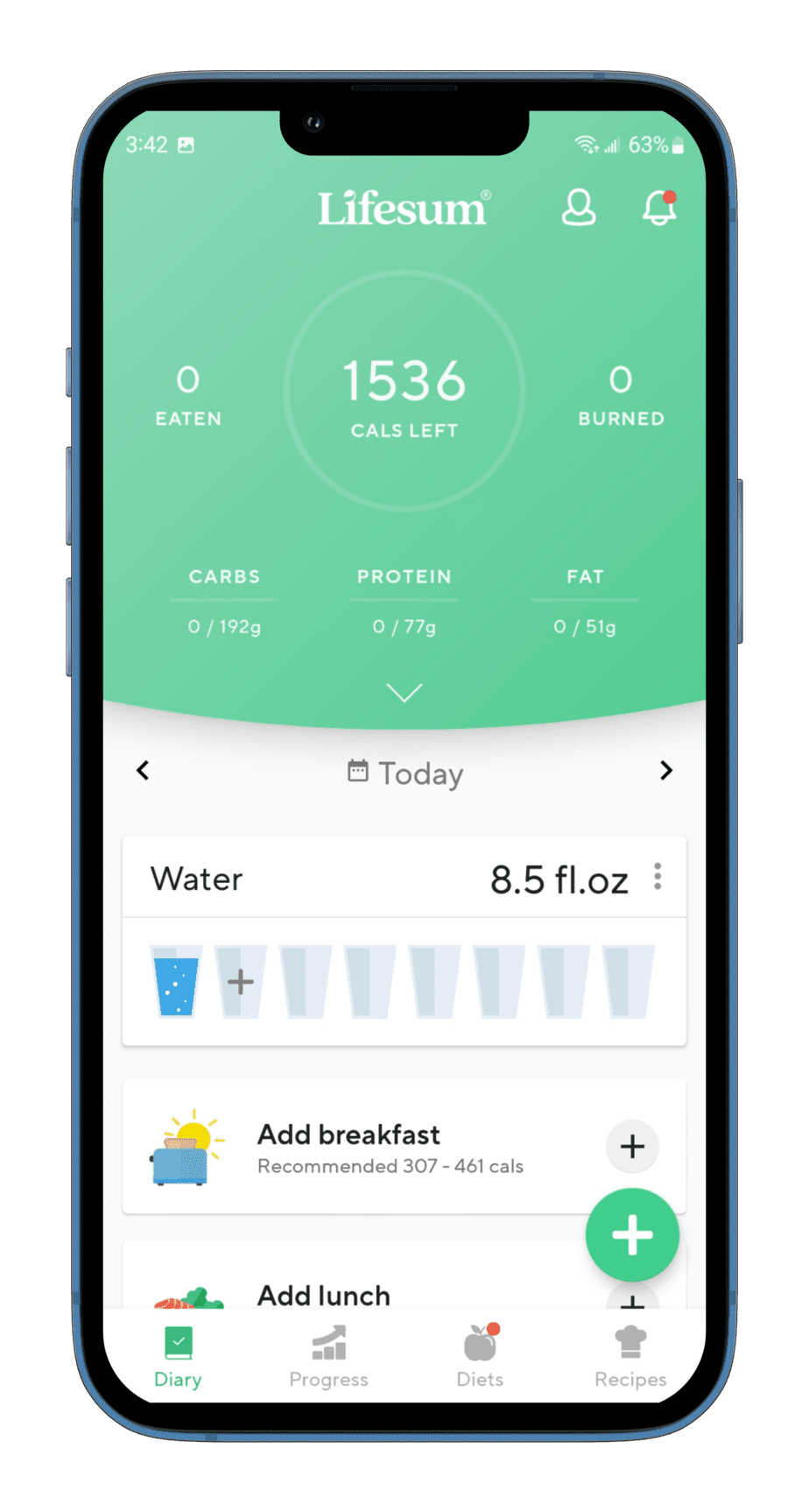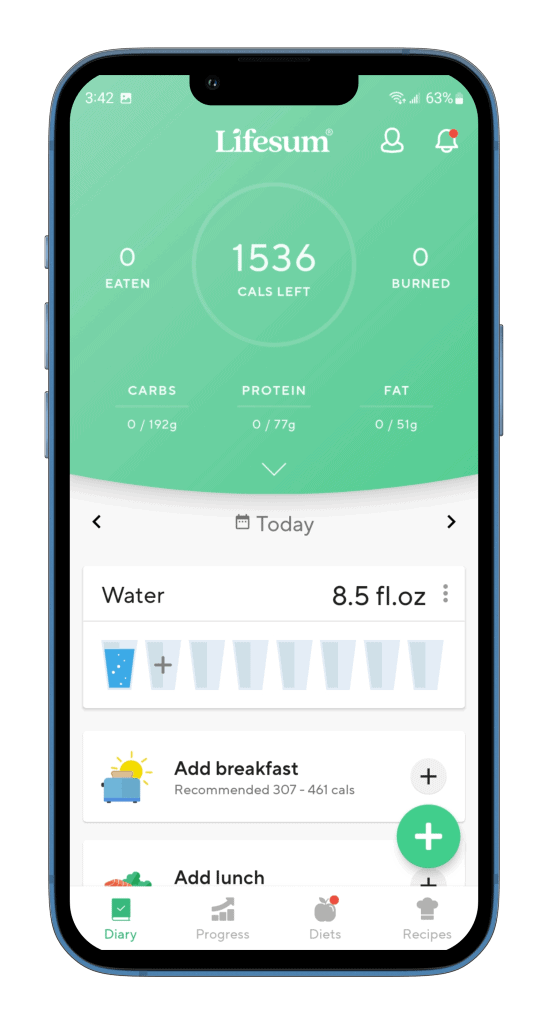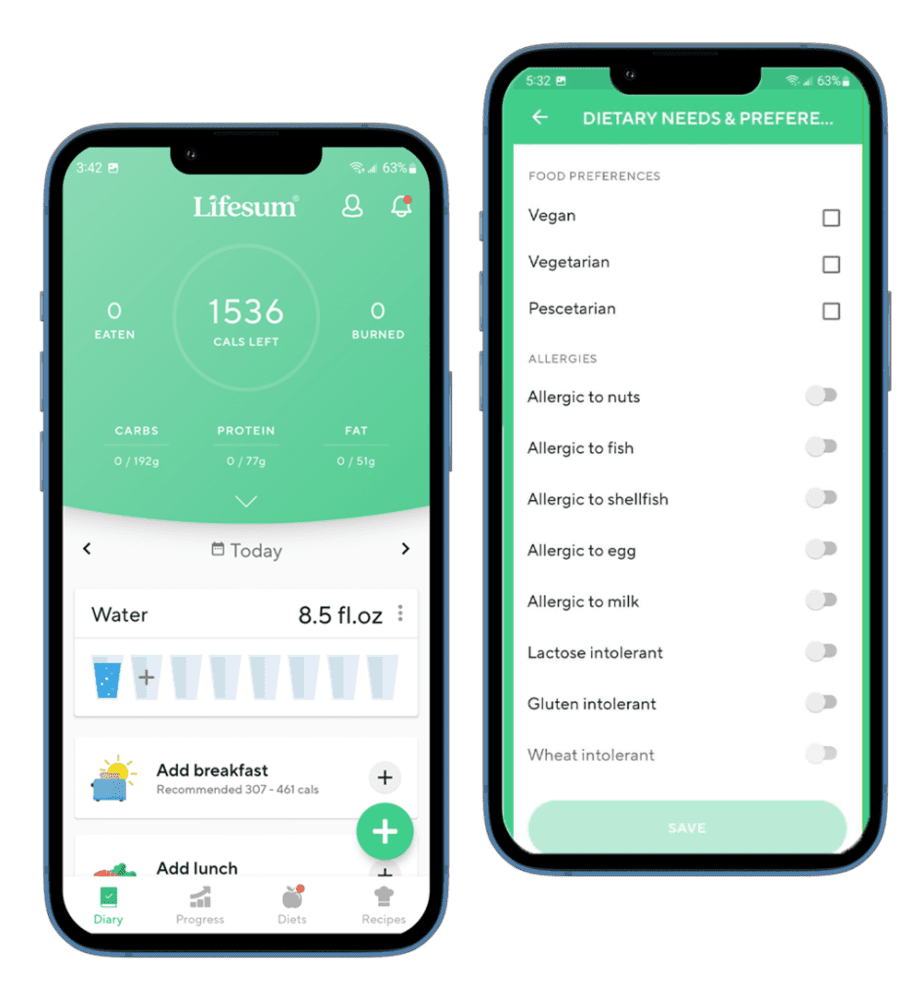Some links in this article are affiliate links, which means we earn from qualifying purchases. Learn more.
The Lifesum health app has taken the nutrition world by storm with over 10 million downloads, but as a nutrition coach, I wanted to try the app to see if it is worth using and recommending to my clients. My colleague Janine Collins also used the app, and we compiled our notes for this review.
Key Takeaways
Honest Review Guarantee from FeastGood: Our testing team purchases each product 100% independently and uses the product for several weeks up to several months before writing a review. Learn more about our review process here.
- Lifesum is a great app for those with a strong background in nutrition who want to customize their calorie and macro targets.
- The app is also good for those working with nutrition coaches who need a platform to track their food intake.
- It has a user-friendly design and an extensive food database, so you won’t struggle to find the foods you want to log. There are also many recipe ideas to inspire you to eat healthy.
- After testing 18+ nutrition apps, our final verdict is that we’d rather use MacroFactor instead for calorie and macro tracking. You can read our MacroFactor review here.
Medical Disclaimer: The content of this article is provided for educational insights only. It should not be used as medical guidance. Individuals with a past of disordered eating should refrain from weight loss programs or calorie tracking. For medical advice, consult a certified healthcare professional. If you’re struggling with eating disorders, contact NEDA for assistance.

What is Lifesum?
Lifesum is a calorie and macro-tracking app that was designed to help you achieve your health and fitness goals. The app is advertised as a health app that will help you become healthier by incorporating its suggested dietary recommendations.
The Lifesum app gets to know you by asking about your current physique and your bodyweight goals to put together a calorie target and plan to help you achieve this goal in a realistic timeframe.
With the Lifesum app, you can choose to follow their customized plan with foods that you would regularly eat, or you could choose to follow one of their meal plans that they have for specific diets that you might be interested in.
For example, if you have a goal of losing weight, the app may recommend eating 1500 calories per day (based on your initial screening questions) and then create a meal plan with recipes based on this caloric target and a breakdown of carbs, proteins, and fats to match that particular diet (i.e. keto – low carb, moderate protein, high fat).
The app can also be used by those who don’t need calorie or macronutrient suggestions but simply want some recipe inspiration because the Lifesum app has a variety of recipes to choose from.
Lifesum was created specifically for those who want to lose weight as their tag line is “get healthy & lose weight” however, there are options to select weight maintenance or weight gain as your primary goal.
Lifesum: Quick Overview & My Experiences
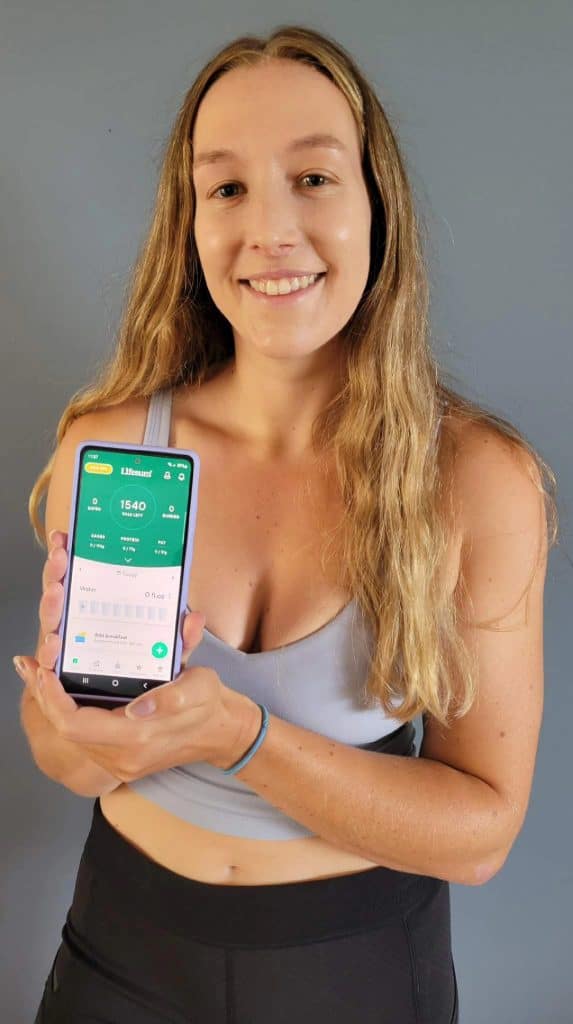
After trying the Lifesum app for a month, I’ve evaluated it based on my personal preferences for a calorie and macro-tracking app and as a potential tool for my nutrition clients.
I’ve concluded that I WOULD use this app myself long-term because I enjoy the recipe ideas and the ease of use when tracking my food.
However, I WOULD NOT use the calorie and macro targets that the app recommends because based on my testing they were very inaccurate.
This is partly because their initial questionnaire doesn’t ask about your activity level, so if you’re active and have more muscle mass, the app will suggest too low of a caloric intake.
For this reason, I think the app would be great for those who can set their own calorie and macronutrient targets, whether it’s by themselves or with guidance from a nutrition coach. I wouldn’t recommend this app to those who would rely on the calorie and macronutrient targets that the app provides.
As such, in order to use the app, you would need to know enough about nutrition (either by yourself or through working with a nutrition coach) to set your own calorie targets based on your goals.
I love that Lifesum is working to promote health by marketing and designing the app with “better health” as their primary focus, regardless of whether you use the app for weight loss, maintenance, or gain.
The app has even put together a Health Test asking around 40 questions about your current eating and exercise habits.
Although the results of this test don’t get automatically factored into the app’s recommendations for you, it does help provide you with information on which habits you should focus on to improve your health.
However, as a nutrition coach who preaches about balance and maintaining a healthy relationship with food, I’m not a fan of all the pre-loaded diets on the app that might make people think they have to drastically change their way of eating to make progress.
Some examples of the pre-loaded diets on the app are: Fasting diets, Keto diets, Paleo, and Clean eating. Most of these meal plans come with a 21-day meal plan and a grocery list that are designed to help you stick to whichever diet you choose.
I do worry that those coming to the app will be seduced by all these diets, which may be unsustainable ways of eating and cause the user to yo-yo diet (diet, fall off track, diet again, fall off track again, etc.)
However, overall, I think this app is a great option for those who know exactly what they’re doing nutritionally and just want a platform to track their intake conveniently with some recipe inspiration.
Lifesum Health App
If you use the link below, you can get 50% off when subscribing to the annual plan. No code is required, it’s automatically applied.
How Does Lifesum Work?
Lifesum works by gathering information about your caloric needs using the initial questions it asks you (i.e. age, height, weight). The app then runs this information through basic calorie calculations and gives you general calorie and micronutrient targets based on this data and your goals.
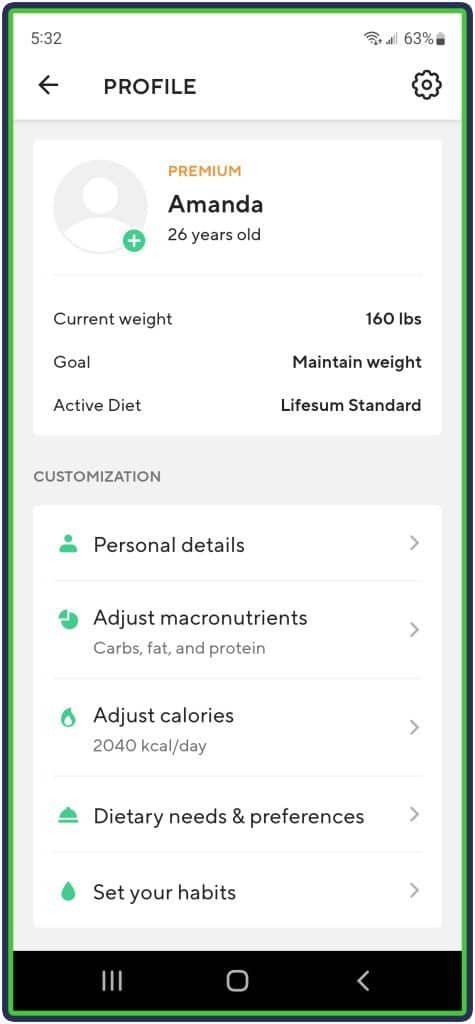
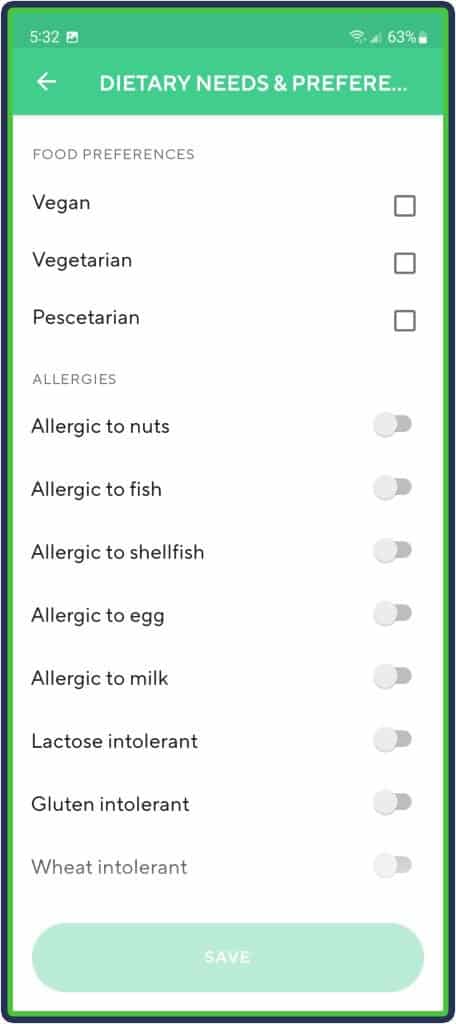
Lifesum asks for your age, height, current weight, and goal weight to run its calculations to find your maintenance calories (the number of calories you need to maintain your weight).
It also requires you to select a goal: weight loss, maintenance, or weight gain.
If you select maintenance as your goal, then it will recommend your calorie goal be equal to the estimated maintenance calories it predicted for you based on its calculations
For example, if it estimates you maintain weight at 2000 calories per day, then your calories will be set to 2000 calories per day.
If you select weight loss as your goal, you can select how aggressive you want to pursue this goal (within reason) by adjusting how much weight you want to lose each week.
The app doesn’t give you a particular timeline to reach your goal, but it will adjust your calorie and macros based on how much you’re comfortable losing each week.
Based on your selected rate of loss (i.e. 1lb/week), it will take your estimated maintenance calories and decrease them to the corresponding calorie and macro targets that will help you achieve this rate of progress.
If you select weight gain as your goal, you also have the option to adjust the rate at which you gain weight. Based on your preferred rate of gain (i.e. 0.5lb/week), the app will add calories to your estimated maintenance calories to encourage weight gain.
There are certain aspects of how Lifesum works that I think are great, but there are also things I’d like to change about the app if I could. In the next section, I’ll dive into what I like and what I don’t like about Lifesum for myself and my clients.
What I Liked About Lifesum
I liked many things about the Lifesum app; in fact, I feel like the app is perfect for someone like me who just wants a convenient way to log my food with the ability to customize my calories and macros how I want.
Remember, I’m a nutrition coach, so I know exactly how many calories I need to achieve my goals, and the macronutrient breakdown of carbs, proteins, and fats.
The key things I liked about this app are:
It Has a Fantastic Recipe Database
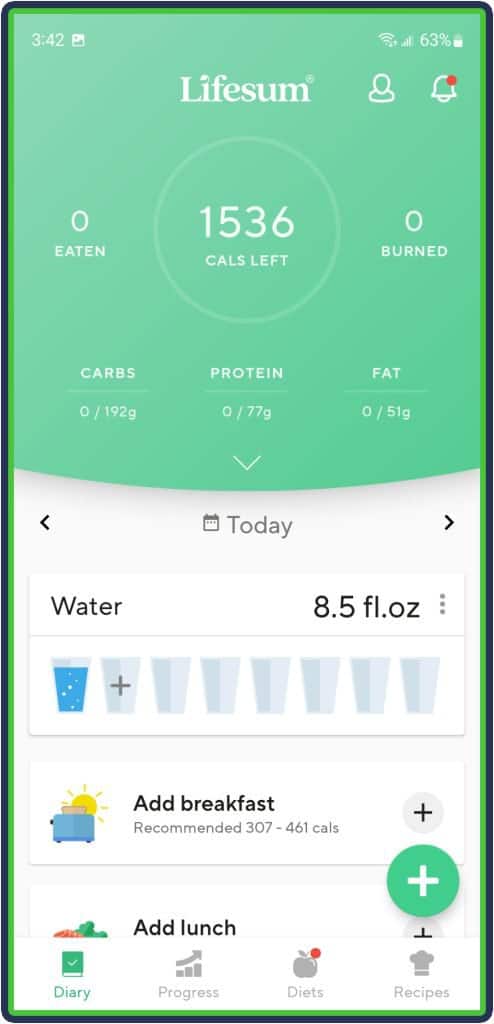
The app has over 250 breakfast, lunch, supper, and snack recipes to keep its users inspired and excited about the food they’re eating.
It Allows You to Set Your Own Calorie and Macro Targets
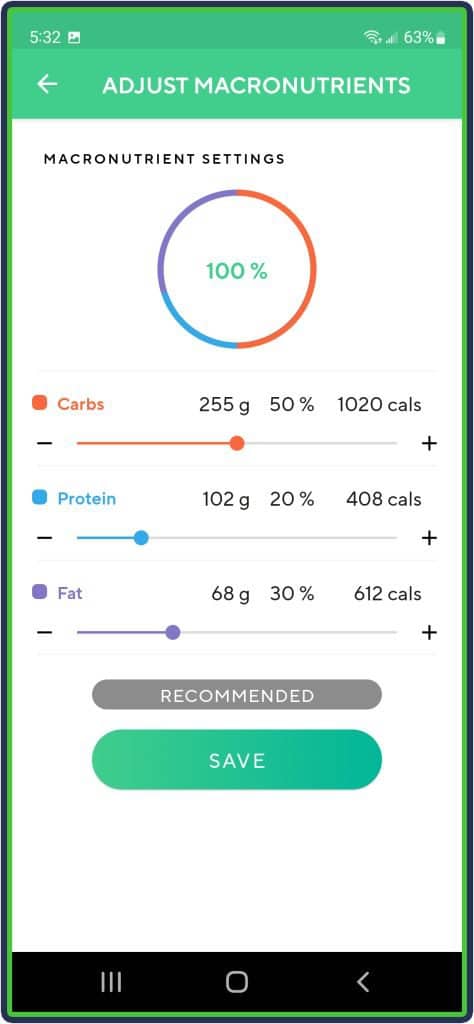
The premium version of Lifesum lets you adjust your calorie and macro intake to personalize it to your needs.
This is a big requirement for me in a calorie and macro tracking app because if the app’s recommendations don’t meet my or my client’s preferences, I want to be able to adjust them.
It Allows You to Track Measurements as well as Weight
The app allows you to track waist, chest, and arm measurements and add your own custom measures.
I like to track my hip and thigh measurements, so I would add these as custom measurements.
I appreciate that the app tracks measurements because oftentimes, measurements change more than your body weight, which is an important sign of progress.
There is a Limit to How Much You Lose Per Week
The app will only allow you to lose a healthy amount of weight each week based on your current body weight.
I love that you can slow down the rate of loss, but you cannot speed it up beyond a certain point. This shows the app values health over ‘results at any cost’.
The Rate of Appropriate Loss Increases as Body Weights Increase
The app was designed to allow those with a higher body fat percentage to lose weight faster than those with a lower body fat percentage.
This is fantastic because it’s normal and healthy for those with a higher body fat percentage to lose weight in higher increments each week (i.e., losing 5lbs per week rather than 1lb).
It Allows You to Set Some Habit Goals
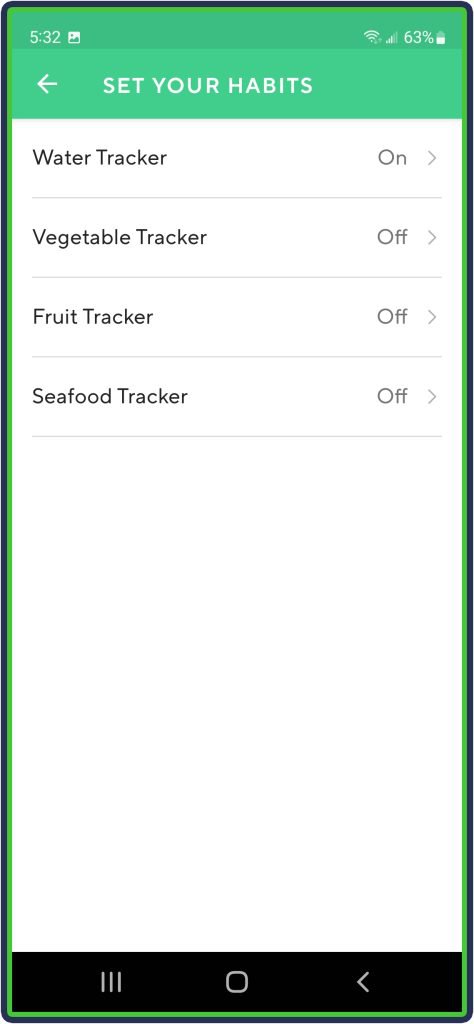
There are options to set water, fruit, vegetable, and seafood serving goals, which I think is fantastic to encourage users to focus on the quality of food they’re eating. I would definitely use this feature with my nutrition clients.
It Provides Nutritional Facts and Ratings for Each Food You Log
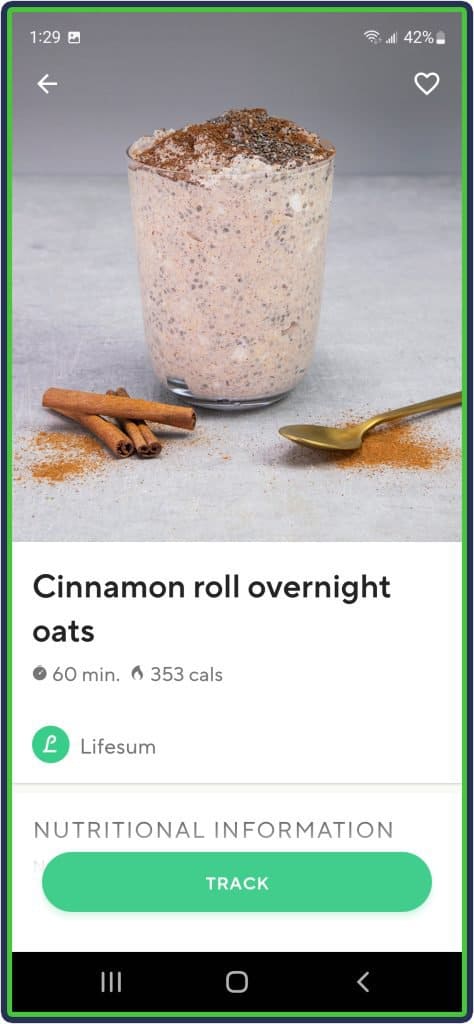

I like that the Lifesum app tries to educate users on the foods they’re about to log by stating their benefits and drawbacks. I think this feature is good for education without demonizing less nutritious foods.
What I Didn’t Like About Lifesum
Although there are many things I like about the app, there are also several things that I really don’t like about the app.
The things I didn’t like about the app are:
Its Calorie Calculations Are Way Off, Especially for Active/Muscular People
The app doesn’t have the most accurate calorie recommendations.
For reference, I weigh 160lbs and maintain my weight by eating 2650 calories per day, but it calculated my maintenance to be 2040 calories.
This is a bigger deal if I select weight loss as my goal because my intake would be severely restricted beyond what it needs to be based on their calculations.
The Inaccurate Calorie Calculations Affect Its Protein Recommendations
During a weight loss phase, it’s important to eat enough protein, generally 1 gram of protein per pound of body weight.
However, the app uses macronutrient percentages (50% carbs, 30% fat, 20% protein) based on their calorie calculations, which means that protein intake will be much lower than it should be because these calculations are inaccurate.
For reference, I should be eating 160 grams of protein (or more) while dieting, but Lifesum recommended I eat 77 grams.
It Doesn’t Ask About Activity Level for Inputs
The app doesn’t factor in activity levels when making its calorie and macro calculations, which is why it’s not very accurate. The app’s calculations would only be accurate for those who don’t exercise.
It Defaults to Adding Calories Back in for Exercise Logged
The app allows you to log your exercise, but when you log exercise into the app, it adds the calories you burned back into your daily intake. This doesn’t allow you to achieve a calorie deficit that is necessary to lose weight. However, there is an option to turn this feature off.
It Has Pre-loaded Diets
I don’t like the app’s pre-loaded diets or how it encourages you to try them because it makes users feel like they have to be on a rigid diet to achieve their goals.
It Still Uses BMI as a Determinant of Health
The fact that the app still has BMI as a measure of health is a bit of a red flag for me because BMI is NOT a determinant of health and is a useless measure. For them to have it on the app will make people think that this is still an appropriate measure.
A better measure of overall health is your waist-to-hip ratio, which research shows is a strong predictor for cardiac risk, one of the biggest risk factors for unhealthy people.
The app currently doesn’t provide this measure, but it could easily incorporate it by adding a hip measurement and providing the user with their associated level of risk based on their ratio.
Key Features & Benefits Of Lifesum
The key features and benefits of Lifesum are:
- User-Friendly Interface
- Large Food Database
- Ability To Customize Intake
- Delicious Recipe Database
User-Friendly Interface
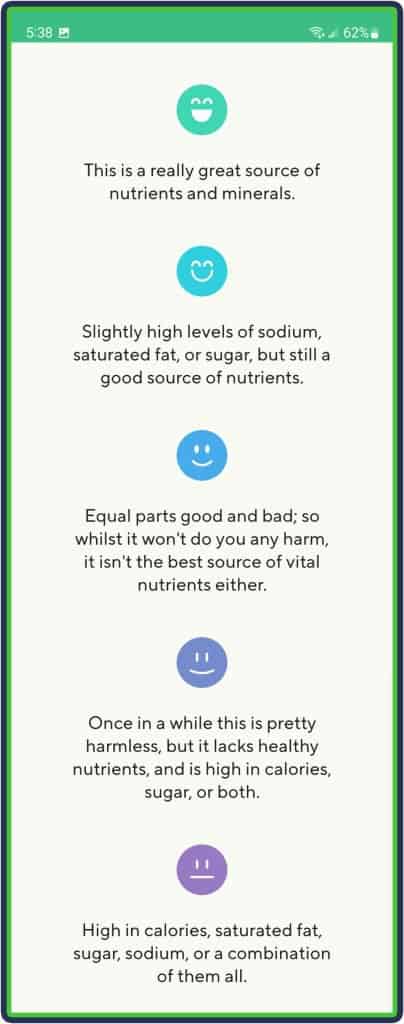
Lifesum has one of the most user-friendly interfaces that I’ve ever used, and it’s very aesthetically pleasing, which is important because the more you enjoy using the app, the more likely you are to be consistent with tracking your intake.
I think that even those who are technologically challenged could use this app without any issues.
Large Food Database
The app has a large food database that encompasses information from 5 verified food databases and also foods that have been created by its users.
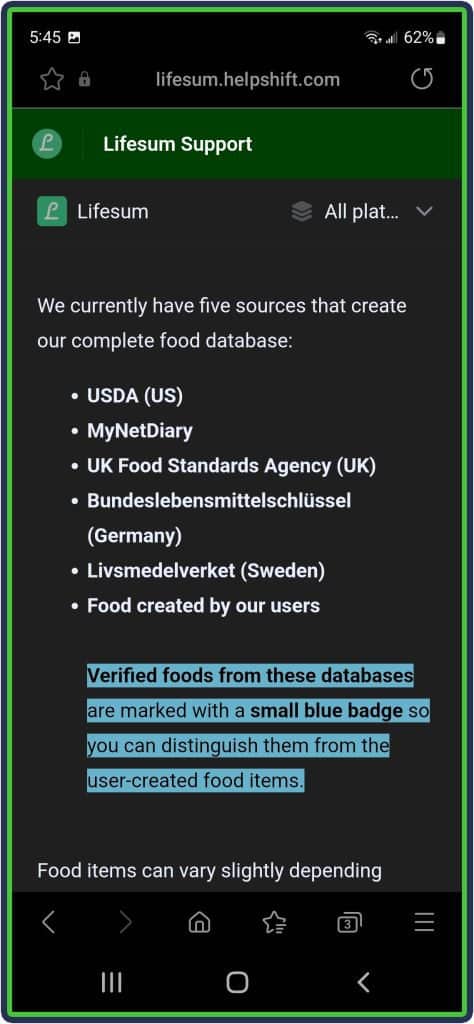
A verified food database has been verified by dietitians to have accurate nutritional information based on specific serving sizes of each food. The foods that are from verified databases have a blue check mark, so you know these foods are more accurate.
The foods without a check mark are foods that have been created by other users and have not been verified to be accurate.
Ultimately, when using the Lifesum app, I recommend sticking exclusively to the foods with a verified checkmark because I found that many of the foods that weren’t verified were inaccurate.
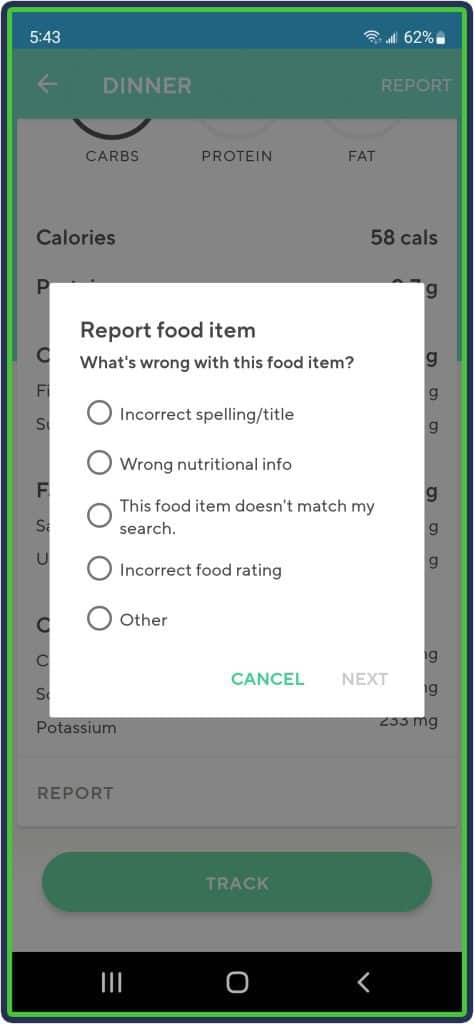
Ability To Customize Intake
One of the best features of the Lifesum app is the ability to customize your intake by adjusting your calorie and macronutrient targets (carbs, fats, protein) as you see fit.
Without this feature, I wouldn’t use the app because I wouldn’t follow the app’s recommendations for calorie and macronutrient targets.
The benefit of customizing your intake is being able to tailor your nutrition to your specific needs because everyone is different and will have different calorie and macros that work best for them.
If you’re very active, then you’ll want the ability toincrease your protein intake and manipulate your carb and fat macros based on what your body responds best to.
The ability to customize is also a massive benefit to those working with a nutrition coach because the coach can recommend calorie and macro targets for the client to set in the app, and they can track them easily in the app.
The Lifesum app also produces a daily, weekly, and monthly report so you can see how your adherence and measure of progress have changed over time, which is great data to share with your nutrition coach.
- Related Article: BetterMe App Review
Delicious Recipe Database
The recipe database that Lifesum has is another key feature of the app and is incredibly beneficial for keeping users excited about working towards their goals and increasing adherence to their diet.
Even those who want to maintain their weight and aren’t as concerned about strict adherence to a calorie target will love the app’s recipes because they serve as a source of inspiration.
Based on my experience working with nutrition clients, I can tell you that most people are always on the hunt for recipe inspiration because they get tired of eating the same things over and over.
Lifesum also claims that new recipes are added often, so users never have to worry about getting bored with their food.
What Other Customers Think
It’s important for you to know what other Lifesum users thought of the app to get other perspectives, so I went through the Google Reviews of the app to see what people had to say.
Right away, I noticed that the app has 4.5/5 stars from 319,291 reviews, which is very impressive considering the number of reviews.
The general consensus from these reviews was that most people had a decent experience using the app, but there are things they wish they could tweak.
Many people agree that the premium version is the way to go because the free version doesn’t give you enough capabilities to use the app effectively.
They also agreed that the diet plans on the app perpetuate diet culture much more than is necessary, which also aligns with my review of the app.
One negative theme among users was that despite having a large food database, many food’s nutritional information is wrong.
While I get the frustration of using a tracking app with inaccurate nutritional information, you must understand that there’s a big difference between verified foods (the ones that have a checkmark) and unverified foods that are created by users.
Most of the user-created foods on the app are inaccurate, but Lifesum can’t correct every single one.
They’ve done their best to provide options to report a food that you notice is incorrect to bring it to their attention, but other than that, there isn’t much they can do.
This is why they ensure they have many food options from the verified databases.
Besides this concern, there were also reports of the app being extremely prone to glitches, which I never experienced myself, but many users did.
The reviews also had many success stories saying that the app helped many people lose weight and gain more insight into the foods they were eating because of the food ratings that Lifesum provides while logging.
Takeaway: Although the app isn’t perfect, the app continues to be one of the most used diet apps on the market.
How Much Does Lifesum Cost?
Lifesum is available with a free version, but unfortunately, with the free version, you’re missing out on key benefits, so Lifesum Premium might be a better option (which I’ll discuss shortly).
Lifesum Premium has 3 different payment plans based on billing periods:
- Monthly
- Quarterly
- Annually
The monthly payment plan will cost you $9.99 USD a month.
The quarterly payment plan, due every 3 months, will cost you $24.99 USD, which equals $8.33 USD per month for reference.
The annual payment plan will cost you $49.99, which equals $4.17 USD per month.
If you’re unsure if the app is a good fit for you, you may want to just sign up for the month.
However, if you know you enjoy the app and plan to use it long-term, then the annual plan is much better.
Unfortunately, Lifesum does not offer a free trial for their premium version at this time.
Is Lifesum Premium Worth It?
Lifesum Premium is necessary to get the most out of this app because you need to have a premium account to adjust your calories and macros yourself, to stop adding calories back in with exercise, and access to all of their recipes.
Without having control over these features, the Lifesum app isn’t worth it. I wouldn’t use the free version of Lifesum or recommend it to my clients because the value of this app is the recipes and the ability to adjust them to your specific needs.
Who Should Use Lifesum?
Lifesum is great for those who are knowledgeable about nutrition to understand how to calculate their calorie goals and the distribution of macronutrients (carbs, protein, fats) based on their goals.
Alternatively, the app could be used by those who have a coach to calculate their nutritional needs for them.
Those with a strong foundation in nutrition or receiving nutrition coaching won’t be swayed by the pre-loaded diets that the app contains because they’ll understand that there isn’t one particular diet that will help them achieve their goals; instead, it’s all about following basic nutrition principles, being realistic, and consistent.
Additionally, the app is good for those who just want to use the Lifesum for recipe inspiration because the app is loaded with great recipes that can help inspire you in the kitchen to keep you enjoying the meals you’re eating.
Who Should NOT Use Lifesum
The Lifesum app is not a good fit for those with limited nutritional knowledge because these individuals wouldn’t know that the app’s recommended intake isn’t accurate.
In fact, I can almost guarantee that everyone with a weight loss goal following the app’s recommendations will eat much less than they would need to lose weight.
This might not sound like an issue because the goal is to lose weight, but if your calories are much lower than they need to be, then you’ll increase your risk of losing muscle mass (negatively impacting your physique) and significantly slow down your metabolism (causing you to burn fewer calories throughout the day).
The underestimation of calories happens because the app doesn’t factor activity level into its calculations, so those who are active will always have this problem with the app.
The app is also unsuitable for those with a negative relationship with food because calories and macros are displayed on the home screen and are the app’s main focus.
Therefore, those with a history of disordered eating would do better with a food journaling app that doesn’t count calories.
Sign Up For Lifesum
The sign-up process for Lifesum was very straightforward, which I appreciated. You sign up by creating an account using your email and a password created by you.
Once your account is created, the app will prompt you to sign up for their premium version with all the bells and whistles, which I recommend you get.
Regardless of whether you sign up for premium or not, the next step is to submit your personal information and dietary preferences so that Lifesum can begin calculating your caloric requirements.
The app also provides a nice walkthrough of its features so that you understand all the features you can access.
Lifesum Alternatives
I’ve tested 18+ nutrition apps (click to check out the full list). Based on my experience, here are some top 2 alternatives:
MacroFactor
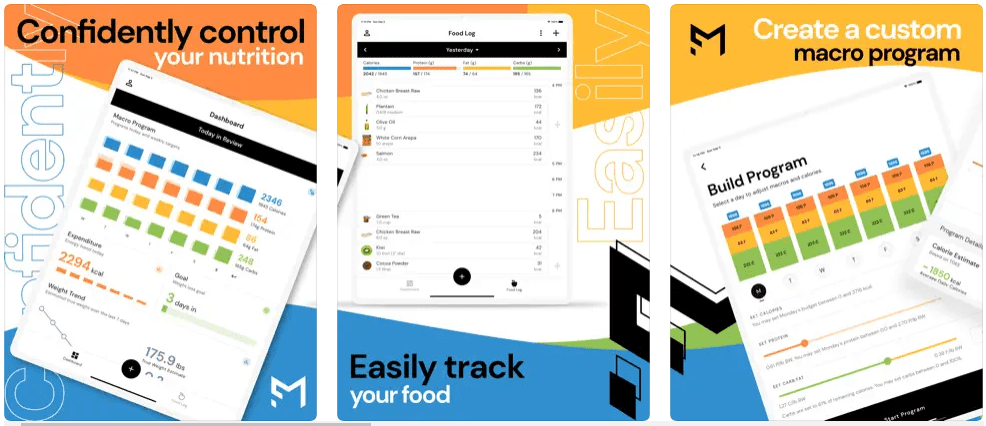
The best Lifesum alternative is MacroFactor, the best calorie and macro tracking app on the market.
MacroFactor is perfect for beginners because it takes the time to educate you as you go along and allows you to decide if you want the app to do the work for you, if you want some control, or if you want total control. Using this link gets you an extra week on your free trial (2 weeks total).
Cancel any time before your trial ends without being charged.
MyFitnessPal
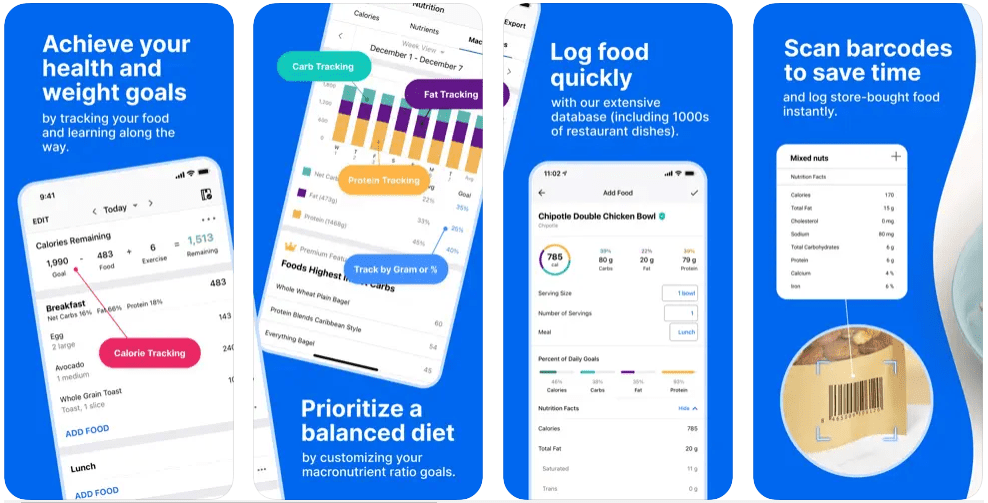
Another alternative to Lifesum is MyFitnessPal which is very similar to Lifesum in terms of its tracking capabilities and its calorie and macro recommendations.
The one thing I like more about MyFitnesspal than Lifesum is that you can adjust your calories and macros using the app’s free version.
If you don’t want to spend money on an app but want the ability to customize your calorie and macro targets, then MyFitnessPal might be your best option.
Lifesum Comparisons
Frequently Asked Questions
Is Lifesum Good For Weight Loss?
Lifesum is good for weight loss because it will help you achieve a calorie deficit (eating fewer calories than you need to maintain weight); however, the Lifesum app may recommend too low of an intake for those who are active, which can be harder to adhere to and put you at higher risk of muscle loss while dieting.
Is Lifesum Free?
The Lifesum health app has a free version that allows you to use the app’s basic functions; however, the premium version of the app is a better option because of its customization features and recipes.
Is Lifesum Compatible With Apple Watch?
The Lifesum app is compatible with Apple Watch, as well as Google Fit, Samsung Health, Withings, Run Keeper, and FitBit.
Is Lifesum Accurate?
The Lifesum app’s calorie and macronutrient calculations are inaccurate for most people because their calculations don’t include activity levels.
Therefore, those who are active or have more muscle will be severely undereating if they follow Lifesum’s recommendations.
How Do I Cancel My Lifesum Subscription?
To cancel your Lifesum subscription, you need to go to your app store, manage your subscriptions, and cancel the Lifesum subscription. Deleting or uninstalling the app will not cancel your subscription.
How To Contact Lifesum?
To contact Lifesum, you can go to their website, scroll to the bottom of the page, and click “contact”. Alternatively, you can use the app to contact Lifesum by going into the app’s settings and selecting “get help”.
Lifesum Health App
If you use the link below, you can get 50% off when subscribing to the annual plan. No code is required, it’s automatically applied.
Other Nutrition App Reviews
- Avatar App Review
- RP Diet App Review
- MyNetDiary Review
- MyMacros+ App Review
- Fooducate App Review
- Noom Review
- Carbon Diet Coach Review
- Cronometer App Review
- FatSecret Review
- Macrostax App Review
- My Diet Coach App Review
- Lose It! App Review
About The Author

Amanda Parker is an author, nutrition coach, and Certified Naturopath. She works with bodybuilders, Olympic weightlifters, and powerlifters to increase performance through nutrition and lifestyle coaching.
Why Trust Our Content

On Staff at FeastGood.com, we have Registered Dietitians, coaches with PhDs in Human Nutrition, and internationally ranked athletes who contribute to our editorial process. This includes research, writing, editing, fact-checking, and product testing/reviews. At a bare minimum, all authors must be certified nutrition coaches by either the National Academy of Sports Medicine, International Sport Sciences Association, or Precision Nutrition. Learn more about our team here.
Have a Question?
If you have any questions or feedback about what you’ve read, you can reach out to us at [email protected]. We respond to every email within 1 business day.
